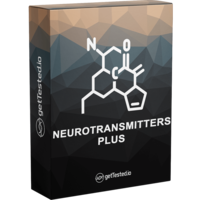Description
What are neurotransmitters Acute or chronic stress – whether it is physical or mental – can affect the balance of our neurotransmitters. Neurotransmitters are molecules that transmit nerve signals between nerve cells in our nervous system. Neurotransmitters are important for our behaviour and emotions and studies have shown that depression is linked to the levels of our neurotransmitters. This test measures serotonin, dopamine, epinephrine and norepinephrine . If you in addition would like to analyse GABA and glutamate, you can choose the test Neurotransmitter Test Plus . Serotonin Serotonin is an important neurotransmitter for our general well-being and is a precursor to melatonin that is needed for our sleep, as well as an antagonist to cortisol. It is best known for its effect on our mood, but serotonin also has a positive effect on sleep, peristalsis, appetite and blood pressure. Calms anxiety Antidepressant effect Mood-raising Relaxing Regulates sleep Appetite regulator Low levels are associated with, for example, obesity, depression, anxiety, insomnia, compulsive obsessive behaviour and migraines. Stress affects the levels of serotonin. During acute stress, serotonin levels rise at first, but with prolonged stress, less and less serotonin is produced at the same time as the body uses more serotonin, which means that the levels decrease. Dopamine Dopamine is needed for our drive and motivation, concentration and our cognitive ability. Dopamine is part of our reward system and is known as the feel-good hormone. Low levels can make us feel unmotivated and depressed. Serotonin has also been linked to restless legs, impaired motor skills, obsessive compulsive and addictive behaviour. In Parkinson’s disease, the nerve cells that produce dopamine die, which leads to the tremors that occur with the disease. Excessive levels of dopamine can lead to memory loss, anxiety, hyperactivity and mood swings. There is a direct link between addiction and imbalanced dopamine levels. Adrenaline Adrenaline, also called epinephrine, is produced in the adrenal medulla and affects our mental activity, heart rate and blood pressure. Threatening and stressful situations can trigger the secretion of adrenaline. Noradrenaline The general function of noradrenaline, also called norepinephrine, is to mobilise the brain and body for action. It increases blood pressure and, together with dopamine, has a positive effect on motivation, concentration and motor skills. Norepinephrine increases with stress and is a precursor to adrenaline. How does the Neurotransmitters Basic test work? All our health tests including our urine tests are done from home. A tube is filled with urine and then sent to our ISO certified lab for analysis. You collect the sample from the second morning urine. The sample is then sent to the lab for analysis and you will receive your answer digitally.


